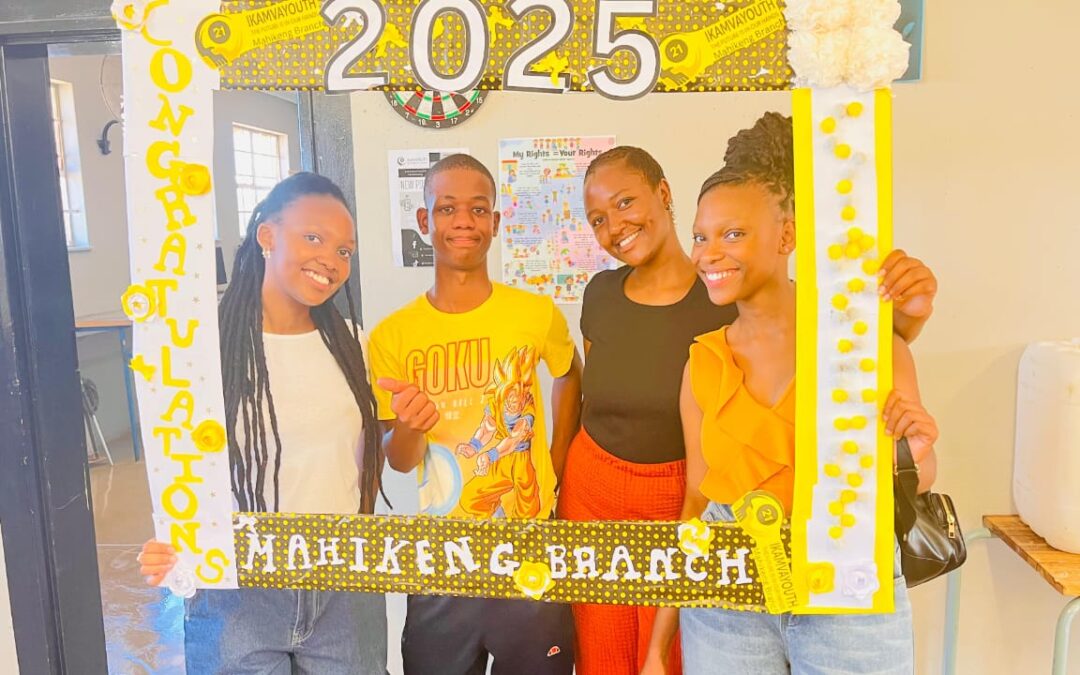
To : All News Editors
Issued : 16 January 2026
Attention : News Reporters / Health and Lifestyle Reporters / Newswires
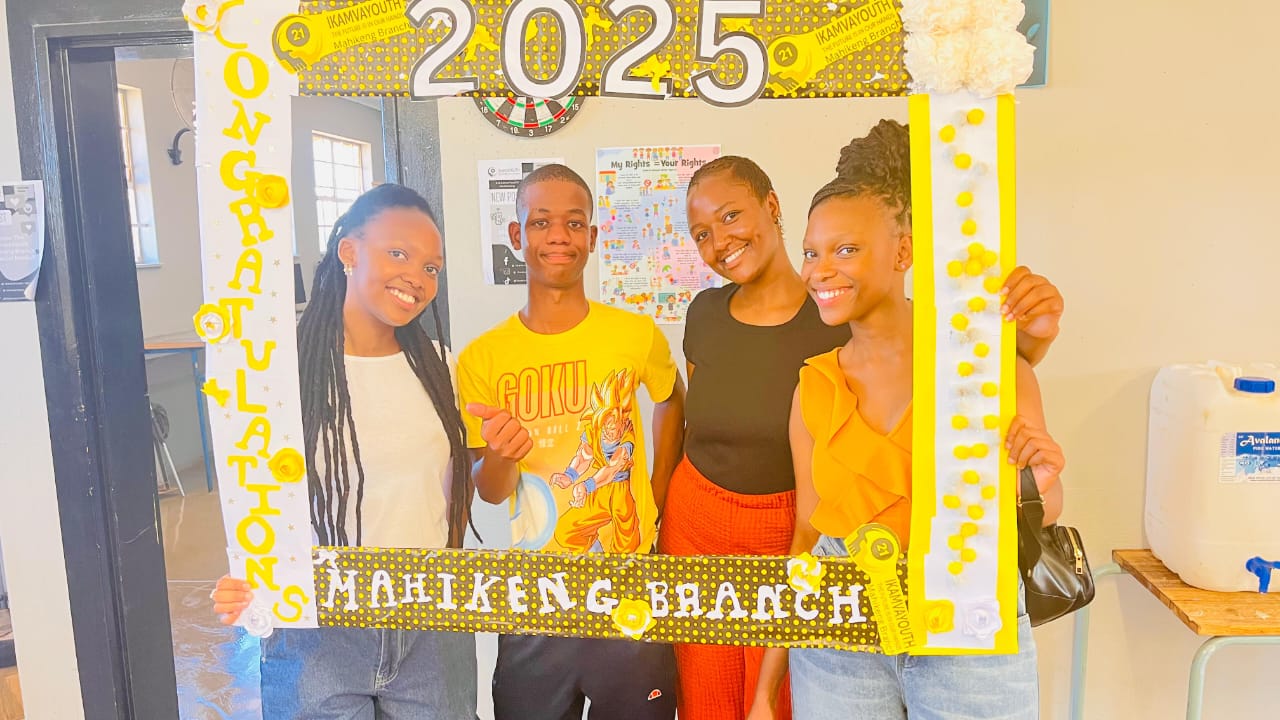
FOR IMMEDIATE RELEASE
IkamvaYouth Matrics Excel with Record Tertiary Eligibility and 100% Pass Rates
South Africa, 16 January 2026 — As South Africa celebrates a historic national matric pass rate aggregate of 88%, IkamvaYouth is proud to announce that its Class of 2025 has significantly outperformed the national average. Multiple IkamvaYouth branches achieved a perfect 100% pass rate, with university eligibility exceeding the national average. These results underscore the effectiveness of IkamvaYouth’s neer-peer tutoring programme in bridging the gap between lower quintile schools and higher education access.
The organisation remains a hallmark of education excellence, and this year, The KwaZulu-Natal region led the organisation’s national performance with a flawless 100% total pass rate. Most notably, the region achieved a 93% tertiary eligibility rate. This regional success was mirrored in the Western Cape, where the collective achieved a 92% total pass rate. Of those, 85% of learners qualified for access to tertiary education,
“Having faced systemic hurdles, they have emerged with results that are nothing short of extraordinary. From the Joza branch in the Eastern Cape to our 100% pass rate branches in Gauteng and the Western Cape, these learners have shown that grit, combined with a safe space to learn, creates a pathway to a dignified livelihood. We are incredibly proud to walk this journey side-by-side with them as they enter their next chapter.” — Hope Chidawanyika, CEO of IkamvaYouth.
In Gauteng, the regional performance reached a record peak with a 92% total pass rate. The region effectively bridged the inequality gap, with 84% of its learners attaining tertiary eligibility.
The Eastern Cape regional cohort achieved a stellar 95% total pass rate, with 80% of learners eligible for post-school education. Meanwhile, the North West region maintained a strong 80% total pass rate, ensuring that 64% of its learners have secured eligibility for post-school opportunities.
“These results are a testament to the power of our ‘pay-it-forward’ model. More than just an academic victory, this success belongs to the learners, volunteers, teachers, parents and their respective communities, many of whom were once Ikamvanites themselves. By returning to their branches to support the next generation, they are proving that sustainable change is driven from within the community. We are not just producing matriculants; we are cultivating a culture of active citizenship and collective success.” — Hope Chidawanyika, CEO of IkamvaYouth.
This means Matrics supported by IkamvaYouth achieved an overall 91% pass rate, of those 81% are eligible for access to Tertiary Education.
By ensuring that 8 out of 10 Ikamvanites across South Africa are now eligible for higher education, IkamvaYouth continues to build a sustainable pipeline out of poverty. The organisation invites the public and corporate partners to join this mission as the Class of 2026 begins its journey toward academic excellence.
-ENDS-
Media Contact
Damien Buckton, Fundraising Manager, damien@ikamvayouth.org, 084 571 7733
More about IkamvaYouth
IkamvaYouth is a South African non-profit organisation empowering youth from under-resourced communities towards improved academic outcomes and accelerated economic access. Through integrated psychosocial support, academic tutoring, and career development, IkamvaYouth consistently delivers an 85% matric pass rate and 85% post-school placement. Operating in high-need provinces and aligned with national and global development goals, the organisation drives inclusive, scalable impact. www.ikamvayouth.org
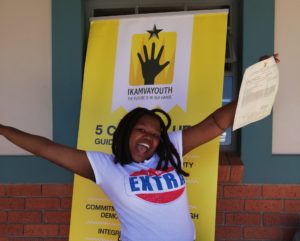
YES YOU CAN still achieve your dreams of earning a dignified living and becoming financially independent!
Last week, the Department of Education released the national matric results for the class of 2018. IkamvaYouth announced a provisional matric pass rate of 81% and celebrations have been taking place at branches across the country. Chances are, you may be pleased with your results, and may even have received your final confirmation of acceptance at your chosen tertiary institution. If this is you, CONGRATS!

If you haven’t done as well as you’d hoped though, don’t worry- It’s not the end of the world. Failing matric or not getting accepted at university doesn’t mean the end of your journey towards earning a dignified living and becoming financially independent. You have a number of options available to you:
- Re-marking/re-checking your exam scripts
- June NSC exam (previously supplementary exams)
- Re-doing your matric
- Vocational training options/ learnerships
Re-marking/re-checking
Firstly, perhaps you were quite surprised by the results you received, and feel the results are not a true reflection of your performance, it might be worth getting your paper/s re-checked or re-marked. You can request to have your scripts re-checked or re-marked at your school (see detailed instructions on the reverse side of your Statement of Results) or on the eGov portal, at www.eservices.gov.za. The deadline for manual requests for a re-check/re-mark is 18 January 2019, AND 20 January 2019 for online applications. Please be advised that the cost per subject, of a re-mark is R105.00 and R25.00 for a re-check.
June NSC exam (previously supplementary exams)
Another option available to you is to register to write the May/June NSC exams. These exams have replaced what was previously known as Supplementary Exams, which were written in February/March. This means that you have more time to prepare for the exams, so be sure to make use of this time! The June NSC exams allows candidates to re-write as many subjects as they need, including failed subjects or subjects they just wish to improve. The deadline for registration for the NSC June exams is 31 January 2019. Please CLICK HERE to access the Department of Education website for further details about the June NSC exams.
Re-doing your matric
If you feel you may not be prepared to write the June NSC exams, but are still determined to complete your matric, you can opt to re-enroll for the NSC as a full time candidate. Rather than simply registering with the Department and aiming to study for the end of year exams on your own, It’s really important that you find a school or institution where you can attend classes and receive support during the year. There are a number of institutions you can go to that offer support with re-doing matric, the following are just a few to get you started on your search (Check out THIS article for more!):
| Institution |
Location |
Contact |
| St Francis Adult Education Centre |
Cape Town |
CLICK HERE for the website |
| Gadra Education |
Grahamstown |
CLICK HERE for the website |
| KZN Matric Excellence |
Durban |
031 373 6391 |
| Damelin Correspondence |
Multiple locations |
CLICK HERE for the website |
| Second Chance Matric Programme |
National |
CLICK HERE for the website |
Vocational options/ Learnerships
Pursuing studies at a TVET college is a great option for students interested in vocational qualifications. Some TVET colleges don’t require a matric! For a list of all the Public TVET colleges in South Africa, CLICK HERE.
Learnerships are a great way to gain a post-matric qualification, while gaining valuable on-the-job training. Requirements for learnerships vary, so it’s important to check if you qualify before applying. CLICK HERE for more information about learnerships, and browse available learnerships HERE.
Central Applications Clearing House
The task of searching for alternative opportunities in January can be quite daunting. Especially after not managing to get accepted at the institutions you may have applied to last year! Thankfully, the Department of Higher Education and Training has established a Central Application Service, which is aimed at making this process simpler. The service “aims to match applicants’ exam results and study preferences with places that need to be filled” at various institutions. To sign up for this service, CLICK HERE.
Even if your matric results weren’t as great as you’d hoped, there are many alternative routes to achieving your dreams. And remember, IkamvaYouth is here to help you every step of the way!

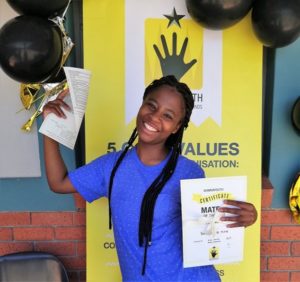

Overjoyed Ikamvanite Simthembile, shows off her results at the recently held Matric Day celebrations
In its 16th year of operation IkamvaYouth is proud to announce an 82% matric pass rate, with a 69.3% tertiary eligibility for its class of 2018. This is a great achievement compared to averages of the schools these learners attend, which sits at 76% matric pass rate with 58% learners eligible for tertiary. Close to 500 learners who were enrolled in the IkamvaYouth matric class of 2018, wrote their final examinations across five provinces in South Africa!
Every year, IkamvaYouth learners’ results far exceed those of their feeder schools and township averages, as the reality of the Basic Education system in South Africa remains that 50% of learners don’t make it to matric.
The Gauteng region led this year’s pack of achievers with a combined 89% pass rate. Established in 2017, our Diepsloot branch, hosted its inaugural matric cohort. The branch has achieved a stellar 100% pass rate with a whopping 94% tertiary eligibility (65% bachelor and 29% diploma passes)!
This success comes despite the many challenges the Diepsloot community faces. In Diepsloot (similar to many townships in the country) there is a clear need for the IkamvaYouth programme. Comparative studies reflect the disparity between education accessed by privileged white learners in suburbs and those in townships. There are great differences in performance and for most learners in the township, reaching matric is an accomplishment.
Maria Masonganye, who attended IkamvaYouth’s Diepsloot branch obtained a Bachelor pass and intends to study at the acclaimed Wits University this year. Maria joined IkamvaYouth while doing Grade 11, she said, “The programme made me realise that working hard pays off and isn’t a waste of my time. I am glad that I joined IkamvaYouth, because it resulted in my marks improving. I learnt that with an education I can do anything I want to do, that nothing is impossible for me. You can change the world with education!”
IkamvaYouth in Joza township, Makhanda in the Eastern Cape achieved a whopping 82% pass rate, far surpassing the provincial average of 71%. IkamvaYouth’s Western Cape region scored a 79% matric pass rate, with the Kuyasa branch boasting the highest number of distinction passes obtained – totalling 28! Our KZN and North West regions respectively achieved 79% and 77% pass rates.
One of IkamvaYouth’s top achievers Lwando Melamane is from the Masiphumelele branch in the Western Cape. He achieved an aggregate of 82.3% with distinctions in Mathematics, IsiXhosa, Life Sciences, Physical Science, Life Orientation, Geography.
Lwando, together with his brother were raised by a single mother, who worked in retail for over 18 years. Committed to his education he has had to overcome many hurdles that come with living in an informal settlement, along with the realisation that he is short sighted. He joined the IkamvaYouth programme, after hearing about it from a friend during his Grade 11 year. He said: “IkamvaYouth provided me with time, space, assistance and a proper studying environment. My mother’s shack was too congested for effective studying.”
We look forward to seeing many of these high achievers making a mark in the next chapter of their lives!
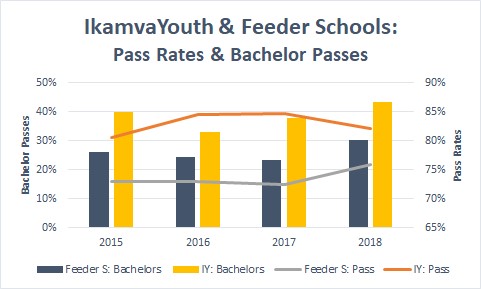
There’s been solid improvement in the quality of passes, with the number of Bachelor passes increasing year on year for the past three years. Even though the feeder schools have improved the number of bachelor passes, they’re still below the level we were achieving at in 2016.
Twelve organisations, which were part of IkamvaYouth’s Community Collaboration programme, (IkamvaYouth’s social franchise which is aimed to create a sector of effective afterschool programmes, implementing the IkamvaYouth model) provided support to over 200 matrics in 2018 and have achieved an exceptional 91% matric pass rate, with 58% bachelor passes and 21% diploma passes.
We are very pleased to share that three of these implementing partners; Bokomoso Education Trust, Mamelodi Initiative and Boys and Girls Club – Protea Glen have achieved a 100% matric pass rate!
Executive Director at IkamvaYouth Lungile Zakwe said: “We are proud of the great effort that has been put in by our learners and tutors and the incredible results speak to our focus on impact. Many young lives have been positively changed through their academic achievements.”
IkamvaYouth relies on the support of many committed volunteers to implement its high impact programme. Sipho Dlamini, a tutor in Diepsloot said he has found IkamvaYouth to be a great platform to express oneself. “I love seeing people progress in life and want to do to more unto others. It takes a village to raise a child and I am a part of this village!”
IkamvaYouth’s work would not be possible without the commitment of our tutors, funders and supporters! Thank you so much!
We would also like to send a big shout out to our biggest donors for 2018: Coca Cola Beverages South Africa, Omidyar Network, Estee Lauder Charitable Foundation, The ELMA Foundation, Capitec Foundation, Cargill and many others.
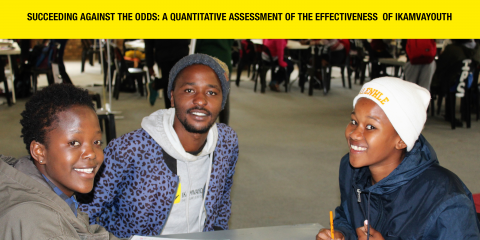

The Western Cape Government hosted the After-School Game Changer’s symposium on the 16th and 17th of February. The two days were packed with interesting speakers who work in different parts of the education and after-school sector. IkamvaYouth was fortunate to secure a spot at the end of the symposium to launch the findings of a quantitative assessment of the effectiveness of our programme. The assessment was conducted in 2016 by Servaas van der Berg and Lewis McLean, economists from Stellenbosch University.
In 2012, Prof van der Berg and Dr Nic Spaull produced Against the Odds, a largely qualitative study of IkamvaYouth, which provided a range of very useful insights, for example, into learners’ socio-economic situations, their performance in Maths and Science compared with the feeder schools, and the challenges they face at tertiary institutions. However, a major limitation of this study was the lack of realistic comparator groups that could serve as counterfactuals. A big challenge was finding an appropriate benchmark against which to measure the ikamvanites’ achievement. How do we know that their great results are due to IkamvaYouth, and not due to their own motivation and achievement which would have led them to perform well anyway, without being a part of IkamvaYouth?
We were thrilled to have Prof van der Berg return in 2016, together with Lewis McLean, to tackle this challenge and assess IkamvaYouth’s impact with a more rigorous approach. In Succeeding Against the Odds, the researchers have managed to control for learners’ prior performance (and thus for factors such as pre-programme motivation and ability), by matching learners with a comparison group of learners who were not part of IkamvaYouth, but achieved the same results in the grade 9 systemic assessments. They could then compare ikamvanites’ matric exam performance with this group of learners, as well as with the results of the feeder schools (in quintiles 1-3), and with quintile 5 schools.
The researchers presented their findings by taking the audience through this presentation, and demystifying the various graphs and statistics. The graphs depicting the distribution of scores for various groups of learners are especially compelling. As background for viewing these distributions, it’s helpful to have a look at Nic Spaull’s article about school inequality in South Africa, where he shows that we essentially have two public education systems operating in parallel; the distribution of scores for learners in the lower quintiles (poorest) schools, compared with those in quintile 5 (most privileged) are markedly distinct from one another. In Succeeding Against the Odds, van der Berg and McLean show that Ikamvanites’s scores bridge this gap, and, in the case of Life Sciences, even meet the distribution of quintile 5 schools.
Andrew Barret, from Olico, said that “what is especially noteworthy about this study is not just that it shows the clear impact of IkamvaYouth, but that it in all likelihood underestimates this impact. As impressive and significant as these results are, the reality is probably even better,” as the researchers included a host of control variables.
As part of the lead up to the presentation, we heard from Yanga Totyi who is the branch coordinator at our Atlantis branch, as well as Ntebaleng Morake an alumna from the Ebony Park who completed matric in 2012. IkamvaYouth Atlantis opened in June 2016 and Yanga spoke about the challenges and triumphs they have had so far. Ntebaleng Morake is a UCT graduate with an honours degree in Gender and Transformation. Ntebaleng accredits her exposure to different fields of study outside of the conventional to her time at IkamvaYouth. Through the programme she was able to meet young, black men and women who were studying and working in different fields and the poverty induced veil of ignorance was lifted.
After the presentation, Dr van der Berg mentioned that the 2012 evaluation had made two recommendations: (i) The alumni in tertiary are struggling and need additional support, and (ii) the researchers cautioned against fast organisational growth, as they felt that the dilution of the organisation’s enthusiastic leadership across a much bigger organisation may lead to the programme losing some its attractiveness to students. He said he was very glad that the organisation had heeded his first recommendation (by establishing the alumni department), and not the second (IkamvaYouth is now operating in 16 townships; a relatively quick expansion from the 5 sites in operation in 2012). When asked for his opinion on what it is that makes the programme effective, Dr van der Berg said he suspects that there is something in the model which makes motivation contagious. He advised us to look into research around Nudge theory, which we will do, as we continue to understand just what it is that makes the ikamvanites so awesome.
We were very encouraged by the participation from other practitioners in the field, who chose to spend their Friday afternoon with us engaging with statistics. Some attendees took to the Twittersphere during the launch:




IkamvaYouth sends out loud big-up thank yous to:
-
DGMT, which got us onto this evaluation journey back in 2012
-
The Omidyar Network, which funded the 2015 evaluation
-
The Department of the Premier of the Western Cape, which accommodated us alongside the very auspicious Game-Changer symposium
-
Yanga and Ntebaleng for speaking at the launch, and grounding this research and the findings within the contextual realities of daily branch operations, and #feesmustfall activism respectively
-
Dr Servaas van der Berg, Lewis McLean and Nic Spaull from RESEP whose insights and perspectives on our work are greatly valued, especially as we know that they are all used to working with far larger datasets, for far more important entities (like the national Government!)
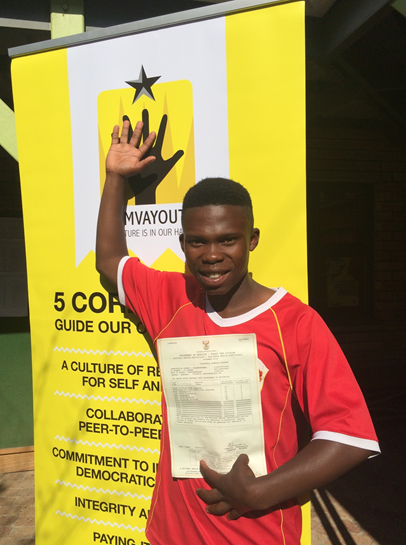
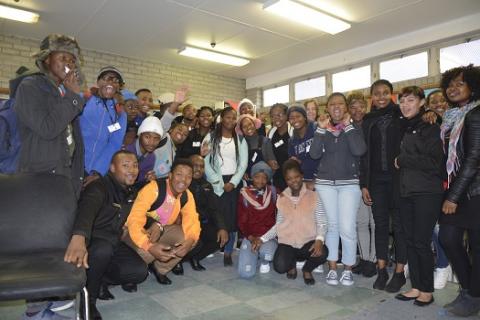
Western Cape learners & tutors at the close of our two-week intensive tutoring during June holidays (Winter School).
IkamvaYouth branches in the Western Cape Province achieved a matric pass rate of 77%, of which 37% are Bachelor passes, and 27% are Diploma passes. 102 learners were enrolled in three branches.
The Nyanga branch came out tops this year with a 90% matric pass rate. A whopping 52% of those who passed also obtained Bachelor passes, while 29% obtained Diploma passes.
The top learner at the Nyanga branch is Kamvalethu Willie who obtained an average of 73%. He also received a distinction for Economics and will be studying towards a BCom in financial accounting at UCT with a full bursary from SAICA. Kamvalethu has been attending tutoring sessions at the branch for five years and had this to say when asked how he managed to keep coming for all those years: “I realised that the help I get is really important and Ikamva is a really nice place to be. It’s nice for me because whenever I achieve something they encourage me. I feel welcome here and it’s like a second home.”

Kamvalethu Willie from Nyanga
The Masiphumelele community lives up to its name, which means “let us succeed”. In the December of 2015 yet another fire ripped through the community leaving many people homeless. Four months into 2016, the community was still trying to recover from the losses and rebuild their lives. Furthermore protests in the community, against crime, had a significant impact on learners’ attendance at school and tutoring. It’s under these circumstances that the Masiphumelele cohort of Matrics started their year. Regardless of all this, Ikamvanites in Masiphumelele were able to achieve an 80% Matric pass rate with 33% of the learners achieving Bachelor passes and 30% with Diploma passes.
Nicolas Commeignes, the Branch Coordinator in Masiphumelele had this to say about the results,“It is an absolute delight to celebrate learners’ successes, especially since we have been overcoming hurdles together and sharing great achievements for almost 4 years now. Through the programme, learners gain maturity and feel more equipped to leave the location and community they grew up in. What has struck me time and time again is that they never forget IkamvaYouth as they always come back to visit; support their families and inspire the younger generation”
One of the top achievers at the Masiphumelele branch is Samkele Hokwana who obtained a Bachelor pass and would like to pursue a degree in Medicine or Mechanical Engineering and says “It’s a matter of days for me to take a new step in life”. On how he achieved his success, Samkele had this to say, “In order to succeed, you have to capitalise on the resources available to you. For example, if I acquired more knowledge while working within a group of classmates, I would focus on that.”

Samkele Hokwana from Masihumelele
Makhaza is home to IkamvaYouth’s largest branch, with 41 learners who sat for the 2016 Matric exams. For the 2016 Matric exams the branch achieved a 66% Matric pass rate where 29% of the learners obtained Bachelor passes and 24% with Diploma passes.
Aphaphame Mzayiya is one of this years top achievers at Makhaza and he will be studying filming and video technology at CPUT. He obtained two distinctions in Geography and History and had this to say about his results,“Finally getting my results has been a relief; it’s been one long holiday anticipating what the future holds. Now I know for sure I will flourish in my field” Aphaphame has come to be known as the resident poet and entertainer and is excited about the field of study he has chosen, “I learnt about IkamvaYouth through a video on YouTube. I then immediately visited the branch. That has been the best decision I made.”

Aphaphame’s advice to the upcoming Grade 12 class is to “just study while others are sleeping.”
The Makhaza branch didn’t perform as well as expected, given its impressive track record of results over the last 11 years. Thankfully, most of the learners who failed are eligible for supplementary exams, and will be receiving intensive support in the lead-up to these second-chance exams. Access to learners has been a major challenge for the branch this year, as learners have had to attend compulsory extra classes at school. IkamvaYouth is hoping to forge a partnership with schools and districts similar to that in the North West Province, where collaboration between the government and the NGO maximises scarce resources in serving learners’ individual needs,and yielded a 90% matric pass rate for Ikamvanites in the region.
IkamvaYouth had matrics writing in ten townships across five Provinces, and learners achieved an overall 85% pass rate; 69% of which are either Bachelor or Diploma passes, ensuring their eligibility for tertiary studies.
About
IkamvaYouth is a non-profit organisation, enabling disadvantaged youth to pull themselves and each other out of poverty through education. The organisation provides free after-school tutoring, career guidance, mentoring, computer literacy training and extra-curricular engagement to learners in grades 8-12. The organisation is currently operating in 16 townships in 5 provinces across South Africa. To find out more, go to www.ikamvayouth.org or call Hetile on 062 105 1707
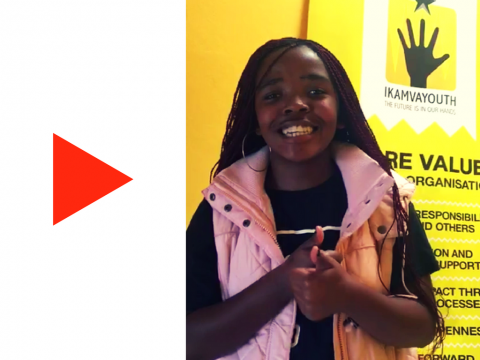
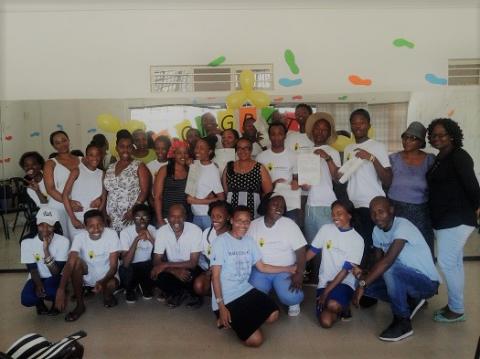
Learners have good reason to celebrate having achieved an 83% matric pass rate.
Kwazulu-Natal saw an increase in its matric pass rate from 60.7% last year to 66.4% in 2016. This Province also managed to produce the second-largest number of bachelor passes, had the largest number of candidates sitting for the 2016 final exams and had the highest participation rate of African learners in Mathematics. Despite the increase in their pass rate, Kwazulu-Natal remains in the bottom 3 provinces with the lowest pass rates along with Limpopo and the Eastern Cape (all three making up 54.5% of the 2016 NSC candidates), reflecting the various socio-economic issues that plague the three most rural provinces in South Africa.
Ikamvanites in Kwazulu-Natal managed to achieve an amazing 83%, surpassing the Provincial rate by almost 17%.
IkamvaYouth has two branches in the Province; in Chesterville (at the Vuyani Nkosi Memorial Youth Centre) and in Umlazi (at the AA Library). Chesterville Ikamvanites saw an 88% pass rate this year with 76% achieving either Bachelor or Diploma passes, ensuring eligibility for tertiary study. Umlazi Ikamvanites also achieved far above the provincial pass rate, hitting 77%. 53% of these learners achieved Bachelor or Diploma passes. Together, the branches had a matric cohort of 64 learners. These Ikamvanites managed to achieve a total of 41 subject distinctions; a really impressive achievement.
Nomathemba Ndwandwe started at IkamvaYouth in 2014 as a grade 10 learner. She says, “I’m so excited and proud of myself. I achieved a Bachelor’s Degree with 2 distinctions. My parents are really proud of me. I am the first in my family to pass Matric”.
Thabisile Mfeka joined IkamvaYouth in 2013 as a grade 9 learner. She says “it has been surreal and I still can’t believe that I’ve made it this far. I appreciate all the support that I’ve received from IkamvaYouth. I doubt that I would’ve made it without IkamvaYouth. I thank all the tutors, staff and sponsors for making all of this possible. I was lucky enough to be part of something as wonderful as IkamvaYouth.”

Watch this interview with Matriculant Thabisile Mfeka to find out what she will be up to this year
Tanyaradzwa Chiyambiro is the Chesterville branch’s top achiever, having joined in 2013. “I am currently feeling relief and am very happy since I received my results; hopefully Wits University will approve my application to study Biomedical Engineering which is what I really really want to do. IkamvaYouth has been amazing; a combination of learning and fun. Being a part of this organisation has been awesome and I’ve learnt the importance of helping others and giving back.”
IkamvaYouth’s tutoring programme is available to learners from grades 9 -12, three times a week and for two weeks during the winter holidays. The tutoring programme is made possible thanks to the hearts and smarts of the amazing volunteer tutors; most of whom are university students and many of whom are ex-learners from the programme. The organisation operates in KZN thanks to very supportive partners, including Coca-Cola Beverages South Africa, Anglo-American Chairman’s Fund, Durban University of Technology, Zoe – Life, and CAFSA, in addition to the municipality, through the Department of Arts & Culture, which provides access to branch venues free of charge, and the schools and other tertiary institutions in the region.
“We are so proud of our learners, volunteers, and colleagues for this amazing achievement. Thanks to our generous sponsors and supporters; we are so appreciative for their ongoing support,” said Joy Olivier, co-founder and director of IkamvaYouth.
Thandazo Mkhize, Chesterville’s Branch Coordinator, says she is very proud and excited about the Class of 2016’s achievements. “These learners have been very consistent throughout the year and their results have proven that hard work really pays. I would like to really appreciate all those who were involved in making sure that the learners do their best, we would not have made it here without the help of the Almighty, and our very hardworking staff, volunteers, parents and our very reliable sponsors, thank you!”
“We are delighted to be in a fortunate position to contribute to the greatness of South African young people through our partnership with IkamvaYouth. To the class of 2016, well done. You are the reason why we will keep investing in young South Africans.” says Tshidi Ramogase, Public Affairs & Communications Director at CCBSA.
About
IkamvaYouth is a non-profit organisation, enabling disadvantaged youth to pull themselves and each other out of poverty through education. The organisation provides free after-school tutoring, career guidance, mentoring, computer literacy training and extra-curricular engagement to learners in grades 8-12. The organisation is currently operating in 16 townships in 5 provinces across South Africa. To find out more, go to www.ikamvayouth.org or call Hetile on 062 105 1707





















 Lloyd Lungu
Lloyd Lungu